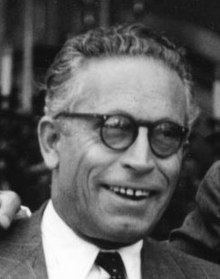| This article relies largely or entirely on a single source. Relevant discussion may be found on the talk page. Please help improve this article by introducing citations to additional sources. Find sources: "Jean Biondi" – news · newspapers · books · scholar · JSTOR (August 2018) |

Jean Dominique Biondi (9 May 1900 – 10 November 1950) was a French politician.
Biography
Jean Biondi was born in Sari-d'Orcino, on the island of Corsica. Educated in Ajaccio, the island's capital, and in Paris, he taught at the Lycée Condorcet in the 9th arrondissement of Paris.
Joining the French Section of the Workers' International (SFIO), the French socialist party, he was one of the editors of the Cri populaire de l'Oise, newspaper of the SFIO in the Oise département. He was elected mayor of Creil in 1935 and entered the Chamber of Deputies in 1936 following a by-election in the Oise département. He was re-elected at the general election which followed later in the year, bringing Léon Blum's Popular Front government to power. In 1937 he was appointed to the editorial committee of the SFIO's official journal Le Populaire.
In July 1940, he was one of the 80 who voted against the grant of special powers to Philippe Pétain and the creation of the Vichy régime. As a consequence Biondi was dismissed as mayor of Creil in 1941. The same year he joined the Comité d'action socialiste, the clandestine form of the then-banned SFIO. Arrested in 1942, he was soon released after which he joined the French Resistance in the form of the Brutus Network. Arrested a second time he was held at Fresnes prison, tortured and deported to Mauthausen-Gusen concentration camp and later moved to the Ebensee concentration camp.
Following the end of the Second World War Biondi returned to France. He was awarded the Médaille de la Résistance, the Croix de Guerre and was made a chevalier of the Légion d'honneur. He was elected to the National Assembly, which replaced the pre-war Chamber and the immediately post-war Consultative Assembly, serving as under-secretary to the Minister of the Interior in Léon Blum's third ministry (1946–47) and later as secretary of state under several prime ministers (1947–50), usually with responsibility for the French Civil Service .
In 1950 Biondi died in a car crash near Groslay.
References
External links
Categories:- 1900 births
- 1950 deaths
- People from Corse-du-Sud
- French Section of the Workers' International politicians
- Members of the 16th Chamber of Deputies of the French Third Republic
- Members of the Provisional Consultative Assembly
- Members of the Constituent Assembly of France (1945)
- Members of the Constituent Assembly of France (1946)
- Deputies of the 1st National Assembly of the French Fourth Republic
- Members of Parliament for Oise
- The Vichy 80
- French Resistance members
- Nazi concentration camp survivors
- Knights of the Legion of Honour
- Recipients of the Croix de Guerre 1939–1945 (France)
- Recipients of the Resistance Medal